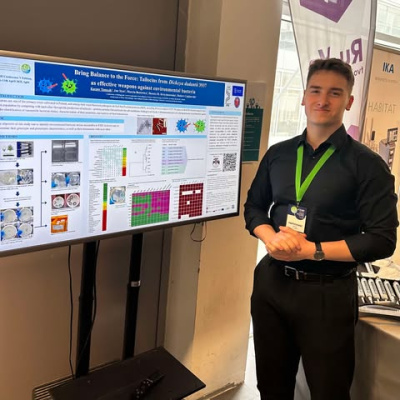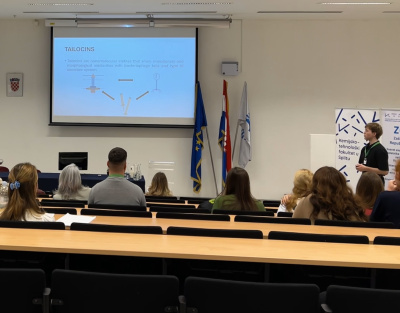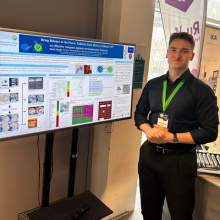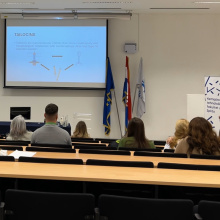
Kacper Tomasik
Two third-year students of the Intercollegiate Faculty of Biotechnology UG and MUG - Kacper Tomasik and Jan Styn - represented the University of Gdańsk at the international scientific conference Znanstveni skup o zaštiti okoliša i održivom razvoju - ZORH 2025, organised by the University of Split (Croatia). They presented the results of their research on the ecological role of plant pathogens. Kacper Tomasik won the award for the best poster.
The aim of the event was to bring together students and scientists interested in environmental protection and innovative approaches to contemporary ecological challenges. The conference was attended by participants from many European countries, including Sweden, Slovenia, Croatia and Serbia. A wide range of issues were discussed, from lithium battery recycling and the presence of mercury in the Adriatic Sea to the use of biodegradable polymers from onion skins as an alternative to plastics.
Kacper Tomasik and Jan Styn had the opportunity to present the results of their latest research carried out as part of individual, optional laboratory practice at the Department of Biologically Active Compounds and the Department of Plant Microbiology of the Intercollegiate Faculty of Biotechnology UG and MUG. The research was conducted under the supervision of mgr. Marcin Borowicz, dr hab. Dorota Krzyżanowska, prof. UG and prof. dr hab. Robert Czajkowski.

Jan Styn
‘Our research stems from prof. Robert Czajkowski's Sonata Bis project, under which I am pursuing my doctoral project,’ says mgr Marcin Borowicz. 'Jan Styn and Kacper Tomasik began working together last year as part of a compulsory course – individual studio work. After its completion, they became so interested in the subject that they decided to start their own research project on the ecological role of plant pathogen tailocins (structures resembling phage tails - fragments of bacterial viruses that bacteria use to fight each other). Thanks to our cooperation and their promising preliminary results, I was able to obtain funding under the UGrants-start programme. We are currently continuing our joint research – the students have already participated in two conferences where they presented their own results, and we are now in the process of preparing a manuscript for publication, in which they will be described in detail.’
When talking about their project, the students explain how they conducted their research and how their scientific path began:
‘Our research focuses on determining the ecological role of tailocins, which are protein-based bactericidal nanostructures. To this end, we identify the range of susceptible environmental bacteria and test their characteristic properties,’ says Kacper Tomasik. ‘We became familiar with the team and research topics of the Department of Biologically Active Compounds during compulsory classes – individual workshops. We liked it so much that our cooperation went beyond the compulsory curriculum and we started our own research project under the supervision of mgr. Marcin Borowicz, prof. dr. hab. Robert Czajkowski and dr hab. Dorota M. Krzyżanowska. During our project, we design and conduct research under the supervision of our supervisor, and under his watchful eye, we learn how to analyse the results obtained.’
‘During the fifth edition of the international ZORH conference, we had the pleasure of presenting the results of our research on tailocin P2D1 produced by Dickeya dadantii 3937 bacteria and its potential ecological impact,’ adds Jan Styn. ‘Our activities focused mainly on the practical aspects of research and analysis, in which dr hab. Dorota Krzyżanowska and prof. Sylwia Jafra from the Department of Plant Microbiology also offered invaluable support. Thanks to their commitment, we had access to the necessary equipment and scientific consultation.’
Participation in the conference in Split and the opportunity to meet international scientists in person was an inspiring experience for the students, although, as they say, preparing a paper and a poster was also quite a challenge, especially in combination with their normal university workload. They are particularly proud of contributing to raising awareness in the scientific community of the importance of seeking alternative strategies to classic antibiotic therapy, such as phage therapies.
‘We are currently focusing on the analysis of sequenced genomes of environmental bacteria sensitive to tailocin P2D1,’ says Jan Styn, when asked about his immediate scientific plans. ‘We plan to publish the results of these analyses in the near future.’
During the conference, Kacper Tomasik won the award for the best poster, which was announced during the closing ceremony of the event.
The research on which the presentations were based was financed from the following sources:
- UGrants-start grant (533-BGB0-GS04-25) awarded to mgr. Marcin Borowicz by the University of Gdańsk,
- SONATA BIS 10 grant (2020/38/E/NZ9/00007) financed by the National Science Centre, implemented by prof. dr hab. Robert Czajkowski.
The University of Gdańsk was represented at the conference by a total of five students. Besides the IFB representatives, the event was attended by: Maja Kuźnik (Faculty of Oceanography and Geography), Magdalena Surdyk (Faculty of Languages) and Adrian Sadowski (Faculty of Biology).
We'd like to congratulate all the representatives!
Funding:
The students‘ participation in the conference was made possible thanks to funding awarded in a competition organised as part of the project ’Support for synergistic and complementary activities of the SEA-EU 2.0 - SEA-nergy project", which is part of the NAWA “Support for European University Alliances” programme from European Social Development Funds.
| Attachment | Size |
|---|---|
| Nagroda.pdf | 260.69 KB |



